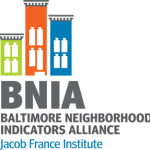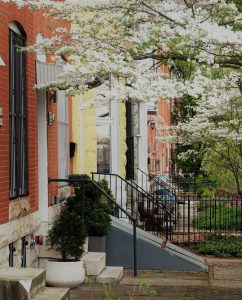Every gift helps
SOLIDIFY UBALT’S COMMITMENT TO
COMMUNITY SERVICE AND ENGAGEMENT.
BALTIMORE COMMUNITY CHANGE PROJECT 2010-2020
Armed with 20 years of community-based data, the Baltimore Neighborhood Indicators Alliance (BNIA) embarked on the “Baltimore Community Change Project 2010-2020.” A clear pattern was identified of neighborhoods diverging apart, creating a dual reality of “Two Baltimores,” where some neighborhoods are growing and getting numerous resources, but others are not.
 In March 2022, BNIA convened a series of online and in-person engagement activities around these findings with support from the France-Merrick Foundation, the Baltimore Community Foundation, the Greater Baltimore Committee, and the Joseph & Harvey Meyerhoff Family Charitable Funds.
In March 2022, BNIA convened a series of online and in-person engagement activities around these findings with support from the France-Merrick Foundation, the Baltimore Community Foundation, the Greater Baltimore Committee, and the Joseph & Harvey Meyerhoff Family Charitable Funds.
Events included three nights of virtual neighborhood trivia, a series of webinars from experts responding to BNIA’s summary briefs, and resident and stakeholder facilitated conversations around challenges and opportunities in Baltimore’s communities.
Cheryl Knott, interim director and research manager at BNIA-JFI, shares that “Through the generous support of our foundation sponsors, the Baltimore Neighborhood Indicators Alliance – Jacob France Institute has created this intentional, data-informed roadmap for eliminating disparities in Baltimore. It’s our goal for stakeholders to use these reports and compiled solutions to focus their efforts in improving quality of life in all of the city’s neighborhoods.”

EXPLORE COMMUNITY CHANGE RESEARCH
- Read the Introduction
- Review Issue Briefs
1. How have population and socio-demographics changed?
2. How have Baltimore’s communities ensured housing diversity?
3. How has Baltimore ensured occupancy and rehabilitation?
4. How has community accessibility and mobility changed?
5. How have Baltimore’s communities become more connected?
6. How have Baltimore’s communities improved quality of life? - Add Your Ideas to the Solutions Database
- Watch Community Change Webinars
- Explore the Community Change Dashboard
- Explore Interactive Community Change Maps
THE UNIVERSITY OF BALTIMORE STORIES:
100TH ANNIVERSARY ORAL HISTORY PROJECT
In anticipation of The University of Baltimore’s Centennial Celebration in 2025, the Robert L. Bogomolny Library’s Special Collections and Archives is conducting an ambitious oral history project. Interviews with alumni, staff, faculty and administrators from across the decades are being conducted, recorded, transcribed, preserved and made accessible online through an ever-expanding digital exhibit.
“The Library’s efforts to recognize and amplify the voices of diverse communities and their histories is reflected in our own archives’ 100th Anniversary Oral History Project, anchoring us in past and present UBalt community voices rather than a written narrative,” says Jeffrey Hutson, dean of the Library.
Support from The University of Baltimore Foundation enabled the Library to train and employ two UBalt student assistants, who worked side by side with archivists to realize this public history project. In FY2022, five video oral histories and six transcribed interviews were conducted and published online in the University’s digital archive.
EXPLORE THE COLLECTED ORAL HISTORIES
The University of Baltimore 100th Anniversary Oral History Project was initiated in Spring 2021 and will continue until 2025 as part of the University of Baltimore centennial celebration plans. The University of Baltimore, founded in 1925, has undergone many changes since its founding. The University of Baltimore’s 100th anniversary will be celebrated in 2025, and Special Collections and Archives aims to conduct extensive oral history interviews with faculty, staff, trustees and alumni. This oral history project sheds more light on the history of the University over the past 50 years. It involves interviewing retired employees and faculty, School’s alumni from every decade over the past 50 years, employees who are about to retire or leave the university, and employees who have worked at the University for many years. Interviewees were selected from a diverse group of people with different responsibilities, duties, ages, backgrounds, and years of service.
CLINICAL LAW PROGRAM
Each year, nearly 200 students in the Clinical Law Program at The University of Baltimore School of Law—ranked eighth in the nation by U.S. News & World Report—are licensed to practice law as student attorneys and represent actual clients under the supervision of faculty who are both expert teachers and practicing lawyers.
Donor support for these clinics not only provides law students with unmatched, real-life practical experience, it also directly impacts communities in Baltimore and beyond.
- In the spring of 2022, the Low-Income Taxpayer Clinic conducted an outreach event to migrant workers on Maryland’s Eastern Shore who had been taken advantage of previously by a fraudulent tax return preparer. The clinic, in collaboration with several other tax services, spent a weekend preparing returns and educating workers about basic tax issues.
- The Community Development Clinic’s student-attorneys counseled clients on 37 different matters, including supporting a land access program for Black farmers; a media cooperative owned by news readers and producers; and organizations devoted to fighting police brutality, expanding STEAM education, and developing community-owned real estate.
- Student-attorneys in the Mediation Clinic for Families worked with the U.S. Department of State in enhancing its ability to communicate with potential participants in mediation involving international abduction of children under the Hague Convention.
More faculty news and program updates from the 2022 Clinical Law Newsletter>>
As a member of the Community Development Fellowship cohort at The University of Baltimore, I had the pleasure of writing grants and fundraising for Sisters Saving the City. Working with this organization exposed me first-hand to the structural inequities facing underserved communities and taught me how community development organizations can better address social justice issues. I am proud to be a student at The University of Baltimore because programs like the Community Development Fellowship have provided me the opportunity to gain practical skills and apply my knowledge towards causes that I am passionate about.”
–STEPHEN JENKINS, B.A. ‘20
PSYCHOLOGY;
CURRENT STUDENT, M.P.A. PROGRAM WITH
PUBLIC & NONPROFIT MANAGEMENT SPECIALIZATION